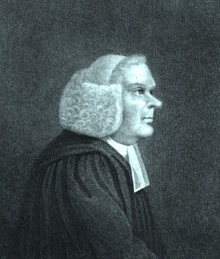John Berridge
J. C. Ryle wrote that as one of "the English evangelists of the eighteenth century" Berridge was "a mighty instrument for good.His father (also John Berridge) was a wealthy farmer and grazier at Kingston, who married a Miss Sarah Hathwaite, in the year 1714.Knowledge of his "fallen state" Berridge wrote in the epitaph on his tomb his stages of religious development.During the time Berridge continued to live in Clare College, he employed John Jones (1700–1770), a liberal clergyman, as resident curate.Now he was assured that his salvation depended solely on Christ's mercies, to wit, that he was "justified by faith" and that "sanctification follows after justification".[14] Berridge does not specify what text of Scripture on which he was musing, but it might well have been Hebrews 4:10 in conjunction with Matthew Poole’s Annotations Upon the Holy Bible (1700).Poole comments that "true Christians have ceased and rested from all their sinful works and labours,"[15] Berridge's conversion was the third in his three stages of religious development that he wrote in the epitaph on his tomb, namely, "Fled to Jesus alone for refuge, 1756".However, a combination of Berridge's improved health and the appointment in 1782 of Richard Whittingham as his curate, the congregations enlarged again."[30] John Wesley commended Berridge "as one of the most simple as well as most sensible of all whom it pleased God to employ in reviving primitive Christianity."[31] Charles Spurgeon included John Berridge on his list of Eccentric Preachers along with Hugh Latimer, Hugh Peters, Daniel Burgess, Rowland Hill, Matthew Wilks, William Dawson, Jacob Gruber, Edward Taylor, Edward Brooke, and Billy Bray."What a lump of quaintness that man was," Spurgeon said, but "what a power he was to stir the souls of men and lead them to the Saviour’s feet".
AnglicanJ. C. RyleKingston on SoarNottinghamshiregrazierClare CollegeFellowChurch of EnglandStapleford, CambridgeshireEverton, BedfordshireTetworthStaplefordsanctificationthe gospeljustification by faithEvertonJohn JonesScripture"justified by faith"Matthew PooleWhitefield's Tabernacle, Tottenham Court RoadpallbearersJohn Wesleyprimitive ChristianityCharles SpurgeonHugh LatimerHugh PetersDaniel BurgessRowland HillWilliam DawsonEdward TaylorBilly BrayJohn William FletcherTabernacleLibriVox